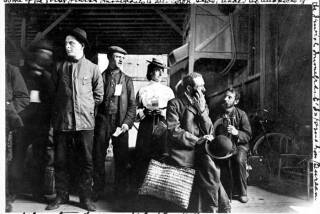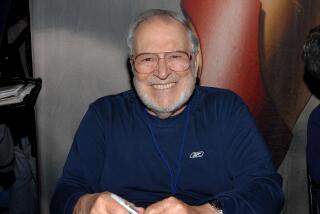Julius Schwartz, 88; DC Comics Editor Revitalized Superheroes in 1950s, ‘60s
- Share via
Julius Schwartz, the influential DC Comics editor whose successful revamping of the Flash, Green Lantern and other defunct 1940s superheroes in the late 1950s and early ‘60s led to what became known as the “Silver Age” of comics, has died. He was 88.
Schwartz, who also was a seminal figure in the science-fiction world as a co-creator of the first science-fiction fan magazine in the early 1930s and as a literary agent for an unknown Ray Bradbury and other luminaries, died of complications from pneumonia Sunday in a New York City hospital.
“DC has lost a living legend ... and a true original,” Paul Levitz, DC’s president and publisher, said in a statement this week.
“He was an enthusiast for the comics,” Bradbury said of his old friend Schwartz in an interview with The Times this week, “and he was responsible for the birth and rebirth of many of the most popular comic heroes in America’s history.”
The Golden Age of Comics, created by the wartime popularity of comic book superheroes, faded after World War II. By the early 1950s, all of its superhero titles with the exceptions of DC’s Superman, Batman and Wonder Woman had been canceled and DC was turning out romances, westerns and what Schwartz later called “funny animal stuff inspired by Walt Disney.”
But in 1956, when the comic book industry was in a severe slump, Schwartz introduced a modern version of the Flash -- the fastest man alive -- in a DC Comics anthology title, Showcase.
“I thought I would update it, change everything but the name: its origins, how he operated, where he operated. And the magazine sold -- as we said in those days -- like hotcakes,” Schwartz told the Pittsburgh Post-Gazette in 2001.
Inspired by the Flash’s success, Schwartz began resurrecting and updating other DC superheroes, including Green Lantern, Hawkman, the Atom and the Justice Society, the superhero team that was renamed the Justice League of America.
The great success of the Justice League of America, which Schwartz considered his “greatest achievement,” spurred rival Marvel Comics to follow suit with its own successful superhero team, the Fantastic Four.
“I have a standard gag,” Schwartz said, “that the Justice League not only saved DC Comics, it saved Marvel Comics too.”
In 1964, Schwartz was asked to rework Batman, whose sales were declining. He oversaw a new look for the character, which included adding the easily recognized bright yellow oval around the bat on the superhero’s chest. A more moody and mysterious tone was added to the stories.
Schwartz, who edited Batman’s adventures through 1978, also edited Superman from 1971 to 1985. Changes that he oversaw included paring down the Man of Steel’s superpowers and turning alter ego Clark Kent into a TV reporter.
Schwartz also is known for having introduced the comic book concept of parallel worlds, the “multiverse,” beginning with a 1961 issue of the Flash in which the Golden Age Flash met the Silver Age Flash.
“He’s a major figure in the development of the modern-day superheroes,” Jon B. Cooke, editor of Comic Book Artists, a magazine compendium of oral histories, told The Times.
“Julie is recognized as resurrecting the superheroes of the ‘40s in a more science-fiction kind of backing: less fantasy, more hard science,” Cooke said. “You knew when you picked up the books that they were edited by Julie Schwartz because they were so wonderfully slick and literate and well done.”
Cooke said Schwartz, who was known for being a tough and demanding editor, had a “crusty veneer, but inside he was just a very sweet guy. And he was infectiously enthusiastic to the end. I spoke to him about four weeks ago, and it was the same as always. He was like an 8-year-old who really enjoyed the cool stuff.”
For the Bronx-born Schwartz, the cool stuff was science fiction. He devoured copies of Amazing Stories, the first all-science fiction magazine, and joined a Bronx science-fiction fan club.
In 1932, he teamed with fellow enthusiasts Mort Weisinger and Forrest J. Ackerman to create The Time Traveller, science fiction’s first fan magazine.
Two years later, Schwartz and Weisinger formed Solar Sales Service, the first literary agency specializing in science fiction. Clients would include not only Bradbury, but also H.P. Lovecraft, Henry Kuttner, Alfred Bester, Leigh Brackett, Robert Bloch and others.
In 1939, Schwartz helped organize the first World Science Fiction Convention, in New York City, where he met Bradbury, then a teenage amateur writer from Los Angeles.
Schwartz became Bradbury’s agent, and in 1941 he made Bradbury’s first short-story sale, to Super Science Stories, for which Bradbury received $15.
At the time, Bradbury was selling newspapers on a Los Angeles street corner. He told The Times that Schwartz had “brought the magazine to the corner to give to me.” It was Bradbury’s 21st birthday.
“He sold the first 70 short stories that I wrote from 1941 up until 1947 to the pulp magazines,” Bradbury said. “A lot of those stories appeared in my first book, ‘Dark Carnival,’ and some of them appeared in my book ‘The Martian Chronicles,’ so he was responsible for my early career and the discovery by various critics and other writers of my talent.”
Schwartz, whom Bradbury recalls as having a “wonderful dry wit” and resembling Groucho Marx, made the transition from science fiction to comic books in 1944. That’s when he was hired as a script editor for Green Lantern and other titles at All-American Comics (one of DC’s predecessor imprints).
“I hadn’t read a comic book story in my life,” he later admitted. “I had to learn from a script what a caption was, what a speech balloon was.”
Though Schwartz retired from DC Comics in 1986 after 42 years, he continued as a “goodwill ambassador” for DC and was a fixture at comic book conventions in the U.S.
He is survived by three grandchildren and five great-grandchildren.
The family asks that donations be made to the Julius Schwartz Scholarship Fund, c/o DC Comics, 1700 Broadway, New York, NY 10019.
More to Read
The biggest entertainment stories
Get our big stories about Hollywood, film, television, music, arts, culture and more right in your inbox as soon as they publish.
You may occasionally receive promotional content from the Los Angeles Times.










